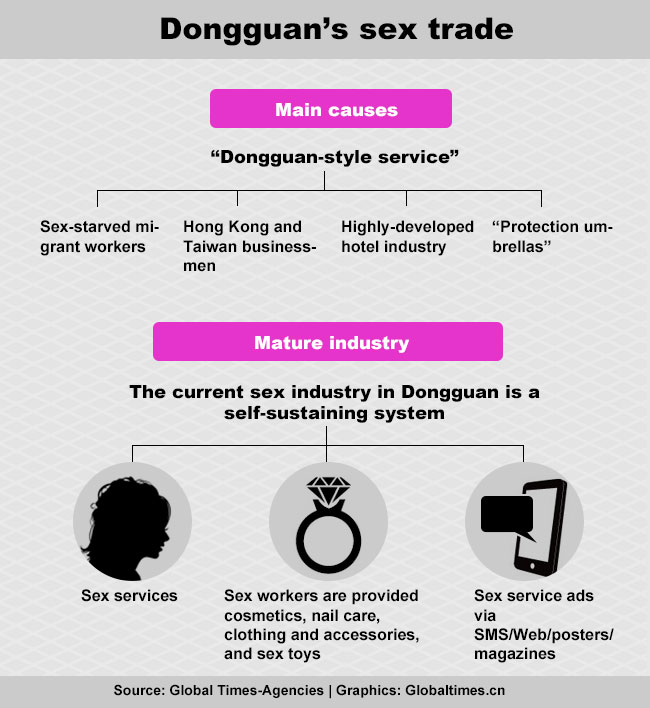The ins and outs of China's 'sex capital'
| Latest News |
Dongguan to crush sex trade
A three-month crackdown on the sex trade in entertainment venues in Dongguan, South China's Guangdong Province was announced Tuesday, shortly after a television exposé revealed the extent of the prostitution business in local hotels.
67 held after Dongguan sex trade exposé
A total of 67 people were arrested and 12 entertainment venues involved in the illegal sex trade were shut down late Sunday night after China Central Television (CCTV) revealed a dozen hotels in Dongguan, South China's Guangdong Province, offered sex services.
This is not the first time that Dongguan, a city with a population of over 8 million known for its lavish casinos and bath houses, as well as its back-street brothels, has been the subject of a police campaign designed to smash the sex trade. Crackdowns like this have been seen at least three times in Dongguan over the past decade.
| "Capital of Sex" |

| "Protection Umbrellas" |
Crackdown ordered on prostitution's "protective umbrella"
Authorities said that people who have provided protection to the sex trade in south China's Dongguan will be severely punished after a state television expose on prostitution in the city.
Hotel managers didn't seem worried about possible police raids or penalties.
Hotel clerks
"We are fine. Being open to you now is proof."
"No police are coming, we would have been put out of business long ago if they had come."
Xinhua
Many question whether entrenched sex businesses in the city can ever truly be stamped out thanks to a local "protective umbrella."
Although no evidence has been provided, it is widely speculated by the public that local police offer protection for Dongguan's rampant prostitution, a dynamic which could stimulate local consumption and bring job opportunities.
Ding Yu, a lecturer with the sociology department at Sun Yat-sen University
It is sometimes hard to decide whether pornographic activities are violating the law, so the police always have a major say in sex trade crackdowns.
Sociologist Li Yinhe
The current anti-prostitution law does not help solve the problem and instead makes the situation worse. It allows criminal organizations to take control of the industry because the government chooses to ignore it.
Liu Renwen, a law professor from the Chinese Academy of Social Sciences
Under the system, police officers have absolute power on who is detained and the length of the detention. They are both players and referees, which easily breeds corruption.
Chen Guo'en, a professor with Wuhan University
The sweep is a part of the anti-graft drive as the high-end escort business is closely intertwined with corruption.
| Prostitution in China |
Prostitution has been outlawed in China since the Communist Party of China took power in 1949.
Since the adoption of the reform and opening-up policy in 1978, China's social administration focused on "sex" has gradually turned into a public security-related problem. Almost every big and medium-sized city witnesses prostitution business to different degrees, so the public is not optimistic that it will be eradicated.
The Law on Penalties for Administration of Public Security prescribed a 10 to 15-day detention and a fine of no more than 5,000 yuan ($826) on adults buying or selling sex.
Related story:
House of sin
|
To Legalize or Not? |
A few Chinese activists and scholars believe that the world's oldest profession should be legalized in the country, arguing that it would increase government tax revenue and better protect the vulnerable and currently "invisible" prostitutes from sexually transmitted diseases and violence.
Sociologist Li Yinhe
Legalization might help to solve the prostitution matter, but the biggest obstacle is attitudes toward morality. She said that part of the problem is that China declared the elimination of prostitution as a goal.
Lü Xinyu, professor with the Fudan Journalism School
Some netizens equate freedom of sex to freedom of the sex market. That's why so many of them are sympathizing with the sex workers in Dongguan and supporting the legalization of prostitution. But as long as there is a sex trade, prostitutes are always the victims.
| Commentary |
Yue Shenshan, CCTV contributor
According to CCTV coverage, the sex industry in Dongguan does not only influence the lives of common people, but also has a negative influence on family stability. Furthermore, the situation frays the bond of trust between people, public security and their officials. It also reduces respect for the law among people. To rebuild public trust in the law, the local government must fight against the criminal act with boldness and courage, and rectify this channel of ill-gotten economic growth.
Global Times editorial
Since the adoption of the reform and opening-up policy in 1978, China's social administration focused on "sex" has gradually turned into a public security-related problem. Almost every big and medium-sized city witnesses prostitution business to different degrees, so the public is not optimistic that it will be eradicated.
Chinese people both home and abroad hold a relatively stringent attitude toward the sex industry. Though there do exist legal red-light zones in Chinese community overseas, it is far from becoming as open as the Netherlands.
China is supposed to choose a way most consistent with its national realities and most conducive to its comprehensive social governance. "Sexual freedom" makes no sense in this "public opinion war" because it is totally different from "freedom of the sex trade."
Xinhua
While the topic remains by and large taboo out of morality concerns, the latest crackdown in Dongguan has prompted sharply divided opinions among the Chinese.
| Gallery |
Web editor: pangqi@globaltimes.com.cn